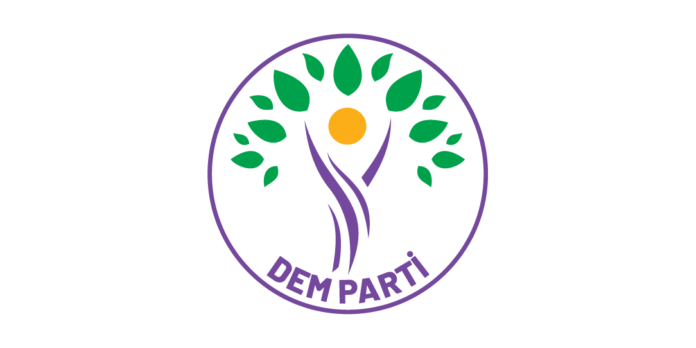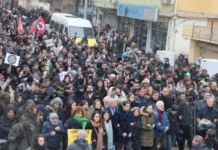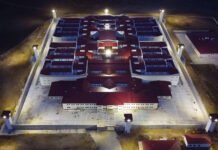The Şırnak Chief Public Prosecutor’s Office has launched an investigation into 13 members of the pro-Kurdish Peoples’ Equality and Democracy Party (DEM Party) for singing a Kurdish anthem during a protest in southeastern Turkey, the Yeni Yaşam news website reported on Thursday.
Those under investigation include Şırnak Co-Mayor Doğan Adıbelli, members of the Peace Mothers, a civil protest group calling for a negotiated peace in Turkey’s Kurdish conflict, the Free Women’s Movement (TJA), and municipal council members who were questioned at a district police station in Şırnak.
During the interrogations, the officers claimed that the anthem was praising the Kurdistan Workers’ Party (PKK), asking questions about who selected it and what was the purpose behind the choice.
Kurds in Turkey are often pressured not to speak their native language. Authorities frequently claim that people speaking in Kurdish are chanting slogans in support of the outlawed PKK, which has been designated as a terrorist organization by Turkey and its Western allies and has been leading an armed insurgency against Turkey’s security forces since the ’80s in a campaign that has claimed the lives of some 40,000 people.
Prohibitions against the use of Kurdish in Turkey go back many years. Kurdish language, clothing, folklore and names were banned in 1937. The words “Kurds,” “Kurdistan” and “Kurdish” were among those officially prohibited. After a military coup in 1980, speaking Kurdish was formally forbidden, even in private life.
The visibility of Kurdish on TV and in the print media was only made possible in the early 2000s thanks to significant progress made in the country’s bid to become a member of the EU.
Yet, the drift towards nationalism and the ruling Justice and Development Party’s (AKP) alliance with the far-right Nationalist Movement Party (MHP) in the last decade has led to an increase in anti-Kurdish racist attacks.
Recently, police have detained dozens due to Kurdish-language songs played at events across the country.
Meryem Eşkara, a TJA activist under investigation for singing the “Herne Pêş” anthem, expressed her disapproval of the investigation. She pointed out that the anthem is not illegal and said that authorities “want to ban songs and anthems from the 1990s.”
Eşkara explained that the anthem is widely available online, adding, “We wanted to march against the appointment of a trustee, but they didn’t allow it, so we sang the anthem to boost our friends’ morale. We do not accept this.”
The party members were allegedly protesting the removal of the former co-mayor of Hakkari province on June 30.
The interior ministry announced on June 3 the removal of former Hakkari co-mayor Mehmet Sıddık Akış of the DEM Party from office due to an ongoing investigation and a separate trial on terrorism-linked charges. He was subsequently replaced by Hakkari Governor Ali Çelik. The ministry’s move attracted widespread criticism and protests for being “anti-democratic” and “hijacking” the will of the Kurdish people.
Akış, the first mayor ousted from office since the March 31 local elections when the DEM Party won a dozen provincial municipalities in the predominantly Kurdish southeast, was also handed down a prison sentence of 19 years, six months on June 5 and sent to prison.
Widespread protests took place in Hakkari and other parts of the country as well as in parliament by DEM Party lawmakers against the removal of the mayor of Hakkari, who had been elected with 48.9 percent of the vote in the March 31 election.
The DEM Party claims that the ruling Justice and Development Party (AKP) government is taking “political revenge” by removing its mayor due to its election failure in the province.
Both the AKP and its far-right ally, the Nationalist Movement Party (MHP), accuse the DEM Party and its predecessors of having links to the PKK.
The parties deny any links to the outlawed group.
Turkey became acquainted with the removal of democratically elected Kurdish mayors from office on terrorism accusations after the local elections of 2016 and 2019, but there were hopes that the government would not resort to such a step this time, given the significant public support afforded DEM Party mayors in the country’s southeast in the local elections.
As a result, the removal of Akış came as a disappointment to many, leading to protests and calls on the government from various segments of society to end the controversial practice and respect the will of the Kurdish people.
In the earlier appointment of trustees, the Turkish government claimed the removal of the Kurdish mayors was a counterterrorism measure and that the elected mayors were funneling municipal funds to the PKK.
The mayors denied the accusations and described them as politically motivated.















